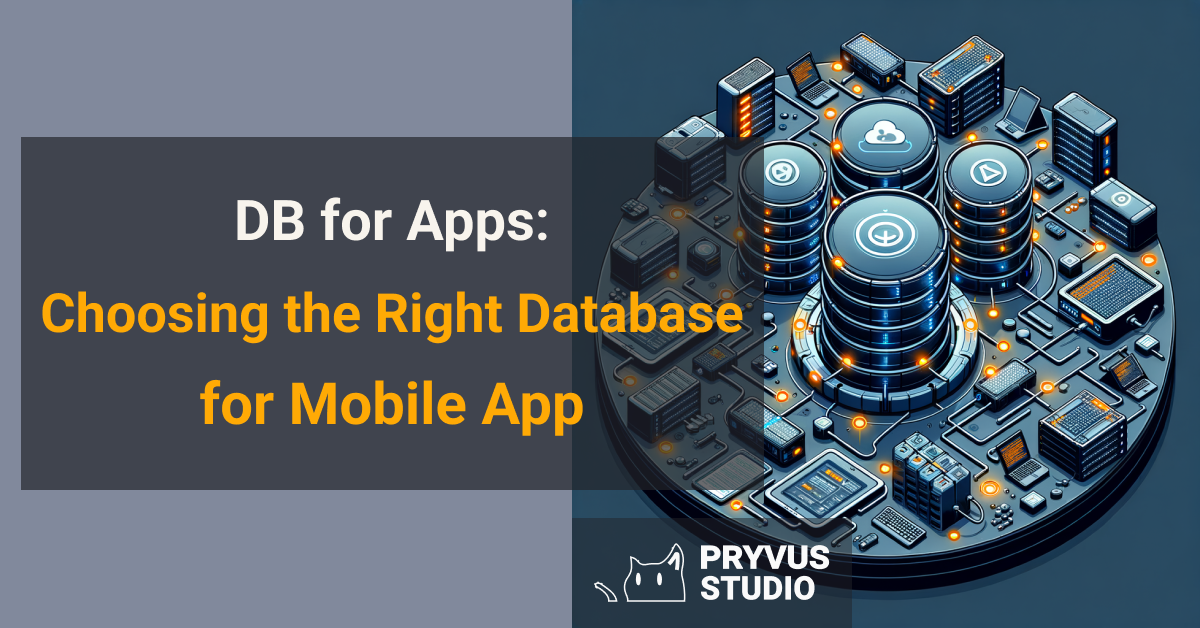Notice: Only variables should be passed by reference in /home/ploi/pryvus.com/public/wp-content/themes/pryvus/template-parts/content-post.php on line 12

Choosing the right database for your mobile app is crucial.
This decision impacts your app’s functionality, security, and scalability. It’s essential to select a database that aligns with your app’s specific needs and long-term goals. In this article, you will learn:
- How to assess your apps specific data requirements
- The differences between popular databases like MySQL and PostgreSQL
- Best practices for database integration with mobile platforms
Understanding Your App’s Needs: A Key to Database Selection
Choosing the right database for your mobile app is no small feat. It’s like picking the foundation for your digital house. Get it right, and you’ve set yourself up for success. Get it wrong, and well, you might find yourself back at square one. So, let’s dive in and figure out how to nail this crucial decision.
First off, know your app’s needs. Sounds simple, right? But it’s more complex than you think. Is your app going to handle a ton of data? Does it need to be lightning-fast? Will it require real-time updates? Answers to these questions will steer you in the right direction.
Let’s talk about data volume and type. If you’re expecting a lot of users, you’ll need a database that can handle that pressure without breaking a sweat. Also, consider the type of data you’ll be dealing with. Text, images, videos, or a mix? Each type has its own storage and retrieval challenges.
Next up, scalability. Your app’s user base might start small, but you’ve got big dreams, right? Choose a database that can grow with you. It’s not just about handling more data. It’s about maintaining performance as your app scales.
Don’t forget about security. This is non-negotiable. With cyber threats lurking around every corner, your database needs to be a fortress. Look for features like encryption and access control.
Lastly, compatibility with your development environment is key. Ensure the database you choose plays nice with the technologies you’re using. This will save you a lot of headaches down the line.
At Pryvus Studio, we’ve navigated these waters more times than we can count. Our experience has taught us that there’s no one-size-fits-all solution. Each project is unique, and so is the perfect database for it.
To sum up, understanding your app’s specific needs is the first critical step in choosing the right database. Consider factors like data volume, scalability, security, and compatibility. Make an informed decision, and you’ll lay a solid foundation for your mobile app’s success.
Comparing Popular Databases: MySQL vs. PostgreSQL
When it comes to choosing the right database for your mobile app, two names often come up: MySQL and PostgreSQL. Both are powerful, open-source database management systems with unique features and capabilities. Your choice between them can significantly impact your app’s functionality, scalability, and maintenance.
Understanding the differences between MySQL and PostgreSQL is crucial for selecting the best database for your mobile app.

MySQL is renowned for its speed and reliability. It’s an excellent choice for applications that require fast data retrieval and high availability. MySQL is also relatively easy to use, making it a popular choice for developers with less experience in database management.
On the other hand, PostgreSQL is known for its advanced features, such as support for complex queries, data warehousing, and concurrency. It also offers extensive data types, including JSON support, making it ideal for apps that deal with complex data structures or require high levels of customization.
Integration with Mobile Platforms: Both databases can be seamlessly integrated with major mobile development platforms. However, the choice of database might affect the complexity of your app’s backend architecture. Understanding your development team’s expertise and the specific requirements of your mobile platform is essential in this context.
Security and Performance Considerations: Security is a paramount concern in mobile app development. PostgreSQL offers robust security features, including advanced encryption options. MySQL also provides solid security capabilities, but PostgreSQL’s comprehensive approach is often preferred for highly sensitive applications. Performance-wise, both databases offer excellent scalability options, but your app’s specific needs might make one more suitable than the other.
Ultimately, the choice between MySQL and PostgreSQL depends on your app’s requirements, your team’s expertise, and your project’s long-term goals. Both databases have their pros and cons, but understanding these can lead you to make an informed decision that best suits your mobile app.
Integrating Your Database with Mobile Platforms: Best Practices
Integrating your database with mobile platforms is a critical step in the development process. It ensures your app can effectively manage and utilize data. The choice of database whether MySQL or PostgreSQL plays a significant role in this integration. Let’s dive into the best practices that can make this integration smooth and efficient.
The key to successful database integration is ensuring compatibility and seamless communication between the database and the mobile app.
First off, it’s crucial to choose a database that aligns with the mobile platform you’re developing for. Both MySQL and PostgreSQL offer robust support for mobile apps, but their integration capabilities can differ based on the development environment and the specific requirements of your app.
Selecting the Right Tools and Frameworks
Utilizing the right tools and frameworks can significantly ease the integration process. For instance, ORM (Object-Relational Mapping) libraries can help bridge the gap between your database and app, making data handling more intuitive.
- For Android apps, Room provides an abstraction layer over SQLite to allow for more robust database access while still using a familiar syntax.
- iOS developers might lean towards CoreData or Realm, depending on their specific needs and performance requirements.
Ensuring Data Synchronization
Data synchronization is another pivotal aspect of database integration. It’s essential for maintaining data consistency across devices and the server. Implementing efficient data syncing mechanisms can prevent data loss and ensure a seamless user experience.
Moreover, considering the scalability of your database from the outset can save you from potential headaches as your app grows. Scalability affects how well your database can handle increasing amounts of data and concurrent users without compromising performance.
Security Measures
Security is paramount, especially when dealing with user data. Implementing encryption for data at rest and in transit, using secure connections, and adhering to best practices for data storage and retrieval can protect your app from vulnerabilities.
In conclusion, integrating your database with mobile platforms requires careful consideration of compatibility, the use of appropriate tools and frameworks, attention to data synchronization, and rigorous security measures. By following these best practices, you can ensure a robust and efficient data management system for your mobile app.
Ensuring Security and Performance in Mobile App Databases
When we talk about mobile apps, two aspects that can’t be overlooked are security and performance. They are the backbone that supports the functionality and reliability of mobile applications. In today’s digital age, where data breaches are becoming more common, prioritizing these factors in your database selection and management is essential.
Securing your mobile app’s database and optimizing its performance are non-negotiable for ensuring a safe and smooth user experience.

Let’s dive into how you can secure your database. First off, implement strong encryption methods for data at rest and in transit. This prevents unauthorized access to sensitive information. Additionally, regularly update your database management system (DBMS) to patch any vulnerabilities. Using authentication mechanisms and access controls further tightens security by ensuring only authorized users can access the database.
But what about performance? A sluggish app can frustrate users and drive them away. That’s where database optimization comes into play. Techniques such as indexing, query optimization, and choosing the right database model (relational or non-relational based on your app’s needs) can significantly improve your app’s response time. Moreover, consider the scalability of your database to handle growth in user numbers and data volume without a hitch.
At Pryvus Studio, we’ve seen firsthand how prioritizing database security and performance can elevate a mobile app from good to great. By adopting best practices in database management, developers can create robust, efficient, and secure mobile applications that stand the test of time.
Making the Right Choice for Your Mobile App
Choosing the right database is more than ticking boxes; it’s about understanding your mobile app’s heart and soul. Let’s face it, the decision can be daunting. But, armed with knowledge, you’re well on your way to making an informed choice. Here’s a quick recap:
- Assess your app’s needs: Volume, type of data, scalability, security, and environment compatibility.
- Compare databases: MySQL excels in speed, PostgreSQL in complex data structures.
- Integrate wisely: Compatibility, efficient data sync, and strict security are keys to successful database integration with mobile platforms.
Remember, security and performance are not just add-ons; they’re essentials. A database that scales, protects, and performs under pressure will set your app apart. Pryvus Studio is here to guide you through this crucial decision. We’ve got the expertise, and we’re ready to help your app succeed. Curious to learn more? Reach out to us. Let’s make your app’s database not just a choice, but the right choice.


